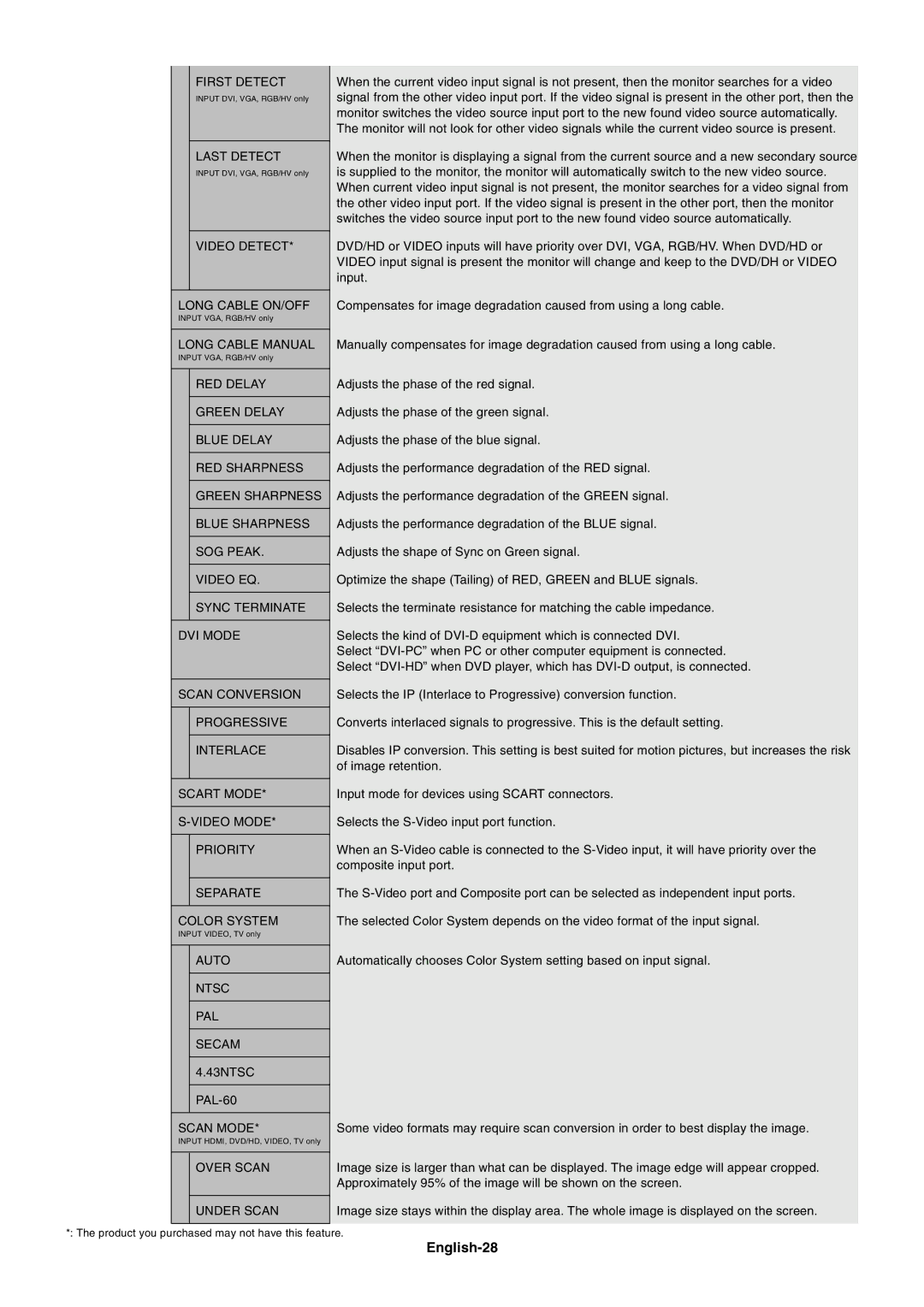
FIRST DETECT
INPUT DVI, VGA, RGB/HV only
LAST DETECT
INPUT DVI, VGA, RGB/HV only
VIDEO DETECT*
LONG CABLE ON/OFF
INPUT VGA, RGB/HV only
LONG CABLE MANUAL
INPUT VGA, RGB/HV only
RED DELAY
GREEN DELAY
BLUE DELAY
RED SHARPNESS
GREEN SHARPNESS
BLUE SHARPNESS
SOG PEAK.
VIDEO EQ.
SYNC TERMINATE
DVI MODE
SCAN CONVERSION
PROGRESSIVE
INTERLACE
SCART MODE*
PRIORITY
SEPARATE
COLOR SYSTEM
INPUT VIDEO, TV only
AUTO
NTSC
PAL
SECAM
4.43NTSC
SCAN MODE*
INPUT HDMI, DVD/HD, VIDEO, TV only
OVER SCAN
UNDER SCAN
When the current video input signal is not present, then the monitor searches for a video signal from the other video input port. If the video signal is present in the other port, then the monitor switches the video source input port to the new found video source automatically. The monitor will not look for other video signals while the current video source is present.
When the monitor is displaying a signal from the current source and a new secondary source is supplied to the monitor, the monitor will automatically switch to the new video source. When current video input signal is not present, the monitor searches for a video signal from the other video input port. If the video signal is present in the other port, then the monitor switches the video source input port to the new found video source automatically.
DVD/HD or VIDEO inputs will have priority over DVI, VGA, RGB/HV. When DVD/HD or VIDEO input signal is present the monitor will change and keep to the DVD/DH or VIDEO input.
Compensates for image degradation caused from using a long cable.
Manually compensates for image degradation caused from using a long cable.
Adjusts the phase of the red signal.
Adjusts the phase of the green signal.
Adjusts the phase of the blue signal.
Adjusts the performance degradation of the RED signal.
Adjusts the performance degradation of the GREEN signal.
Adjusts the performance degradation of the BLUE signal.
Adjusts the shape of Sync on Green signal.
Optimize the shape (Tailing) of RED, GREEN and BLUE signals.
Selects the terminate resistance for matching the cable impedance.
Selects the kind of
Select
Selects the IP (Interlace to Progressive) conversion function.
Converts interlaced signals to progressive. This is the default setting.
Disables IP conversion. This setting is best suited for motion pictures, but increases the risk of image retention.
Input mode for devices using SCART connectors.
Selects the
When an
The
The selected Color System depends on the video format of the input signal.
Automatically chooses Color System setting based on input signal.
Some video formats may require scan conversion in order to best display the image.
Image size is larger than what can be displayed. The image edge will appear cropped. Approximately 95% of the image will be shown on the screen.
Image size stays within the display area. The whole image is displayed on the screen.
*: The product you purchased may not have this feature.
